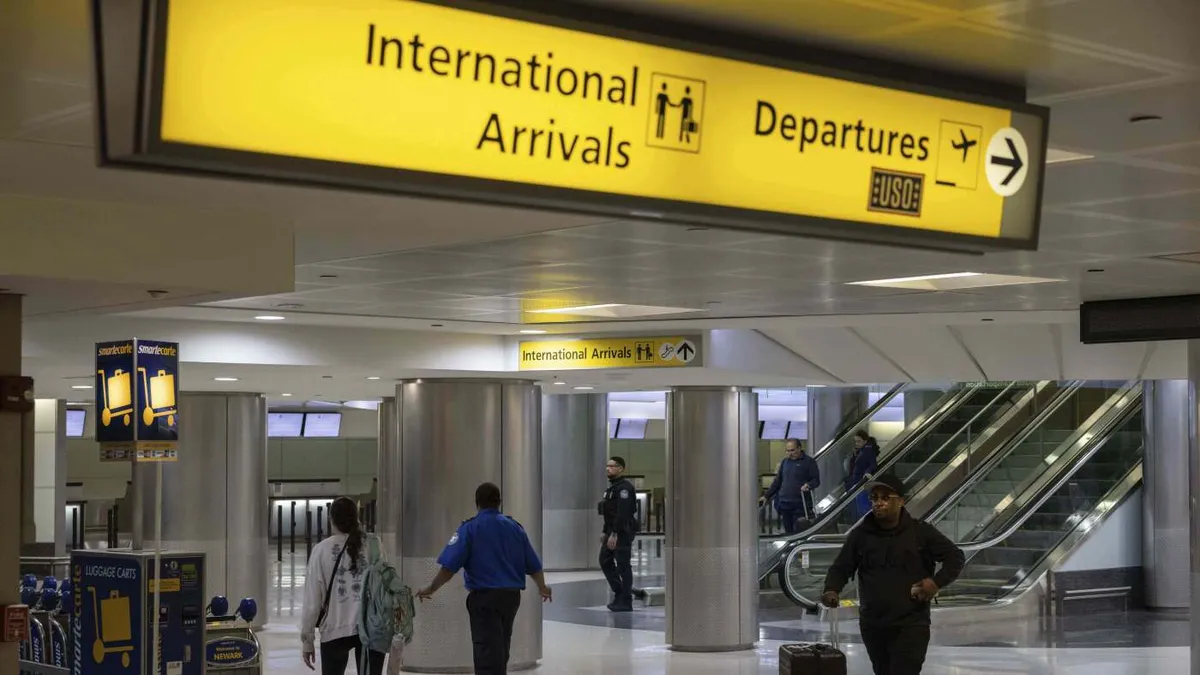
President Trump's extensive new travel ban took effect just after midnight on Monday, prohibiting nationals from 12 countries from entering the U.S. and imposing partial restrictions on individuals from another seven nations. Announced following a firebombing attack in Colorado, Trump emphasized the necessity of this policy for national security, indicating a revival of a controversial travel ban from his first term. The recent terror attack in Boulder highlighted the dangers posed by foreign nationals who are not properly vetted, as well as those who overstay their visas, Trump stated in a video introducing the ban.
The travel ban primarily targets countries in Africa and the Middle East. Notably, the individual charged in the Colorado attack hails from Egypt, a country not included on the restricted list. Trump has indicated that the list of countries could be adjusted over time based on improvements in vetting processes or the emergence of new threats.
Legal experts anticipate challenges to the new travel ban but note that it contains significant differences from the previous iteration. The 2017 ban, which predominantly affected Muslim-majority countries, faced immediate backlash and legal hurdles. The Supreme Court upheld a revised version in 2018, but former President Joe Biden rescinded it on his first day in office in 2021, labeling it a "stain on our national conscience."
Georgetown University law professor Stephen Vladeck remarked that the latest travel ban appears more refined compared to the earlier version. "It looks radically different from the clumsier attempts we saw during the first Trump administration," he noted.
The comprehensive ban applies to foreign nationals from the following 12 countries: Afghanistan, Myanmar, Chad, the Republic of Congo, Equatorial Guinea, Eritrea, Haiti, Iran, Libya, Somalia, Sudan, and Yemen. Heightened restrictions are also imposed on individuals from Burundi, Cuba, Laos, Sierra Leone, Togo, Turkmenistan, and Venezuela.
The White House has identified these 12 countries as deficient in screening and vetting processes, thereby posing a significant risk to the United States. The other seven countries are similarly deemed high-risk. The travel ban has been in development for some time, with Trump initiating an executive order on his first day back in office, directing various agencies to identify countries with inadequate vetting.
In his announcement, Trump cited several factors influencing the inclusion of these countries, including the presence of terrorists, lack of cooperation on visa security, inability to verify travelers' identities, and high rates of visa overstays. Specific countries, such as Libya and Somalia, lack a cooperative central authority for issuing passports, while others have documented overstay rates ranging from 7.69% for Cuba to 49.54% for Chad.
While these percentages seem high, they represent a relatively small number of individuals compared to travelers from countries without visa requirements. For instance, the overstay rate for visitors from Spain was only 2.4%, amounting to over 20,000 people in fiscal year 2023.
The travel ban predominantly impacts the visa application process, including pending applications in the listed countries. The State Department advised U.S. embassies and consulates not to revoke existing visas but to deny applications from individuals who haven't yet received their visas. Starting Monday, applications will be rejected unless applicants qualify for specific exemptions.
Customs and Border Protection (CBP) agents will decide on the admission of individuals at the border, with the Department of Homeland Security asserting that the ban is essential for national security and restoring integrity to the immigration system.
The new proclamation allows for certain exemptions, including lawful permanent residents, existing visa holders, and individuals whose entry aligns with U.S. national interests. Exceptions include dual nationals traveling on a passport from a non-banned country, children adopted by U.S. citizens, and Afghan nationals who were employed by the U.S. government during the military campaign in Afghanistan.
Moreover, members of athletic teams traveling for significant sporting events, such as the 2026 FIFA World Cup and the 2028 Summer Olympics, are also exempt from the ban.
The ban has drawn criticism from foreign leaders and international organizations, with Amnesty International labeling it as discriminatory and cruel. The African Union Commission expressed concern over the potential harm to diplomatic relations, educational exchanges, and people-to-people ties.
Some African officials have shown a willingness to engage in dialogue with the U.S. regarding the concerns raised, while others, like Chad's president, announced a suspension of visa issuance to U.S. citizens in response to the travel ban.
The current travel ban differs significantly from the one enacted in January 2017, which targeted seven majority-Muslim countries and was met with widespread protests and legal challenges. Immigration lawyer Mariam Masumi noted that the latest ban has seen more orderly implementation, reducing the potential for public disruption and backlash.
This time, the ban avoids explicitly targeting Muslim-majority countries, instead focusing on specific national security concerns. However, experts warn that the policy may still adversely affect families, workers, and refugees and could impact the U.S.'s global reputation.
Legal experts expect challenges to the new travel ban, focusing on the factual basis used to justify targeting certain countries. Vladeck suggested that lawsuits could arise from individuals already in the U.S. or those from abroad with strong legal arguments for being allowed entry. The careful crafting of the travel ban's language may help it withstand some legal scrutiny, but enforcement might lead to further legal complications.
As the situation unfolds, the implications of this travel ban will be closely monitored, both domestically and internationally, as it shapes the future of U.S. immigration policy.